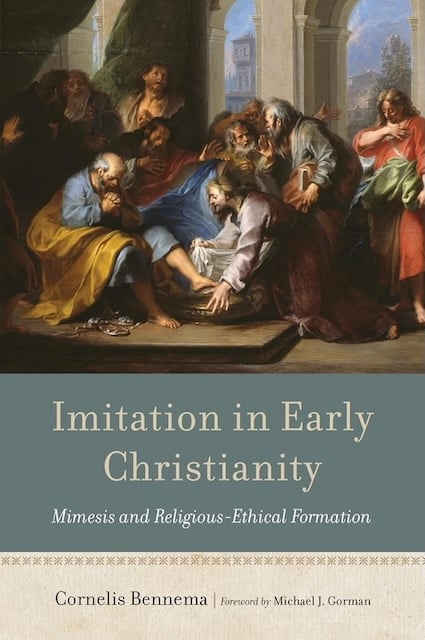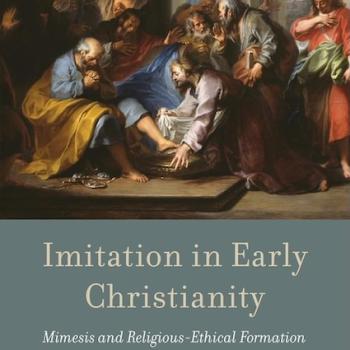It has been said that ‘imitation is the most sincere form of flattery’. But this book is not really about early Christian attempts at flattering one’s teacher, or mentor, or spiritual parents. It is about ethical transformation of persons, and in particular ethical transformation in the image of Christ, which is indeed an important subject in the NT. In one sense the book is a reminder that a person becomes what they admire, particularly when one is admiring a person that one also worships! It also has to be admitted from the outset that in many circles in the English speaking world, the term ‘imitation’ has a negative valence. It is even coupled with adjectives like cheap– ‘cheap imitation’. This book has nothing to do with that sort of superficial or sycophantic sort of behavior that doesn’t really entail identity transformation. With those caveats, we can clear the air and hopefully do a useful job of reviewing an important book for the field of NT studies.
There are various different ways Biblical scholars approach their tasks, when it comes to publishing scholarly work. Some choose to write detailed scholarly monographs in which they are mainly engaging with other scholars, and seeking to further the conversation on some subject or aspect of Biblical studies. Indeed, some spend the vast majority of their writing careers in this fashion . One such scholar is Cornelius Bennema, who has spent years dealing with the subject of mimesis, or imitation, having published previous articles and monographs on some part of this subject (for instance mimesis in the Johannine literature). Now, finally we have a comprehensive treatment of this subject that deals with the OT, with early Judaism, with the Greco Roman world, with the NT, and with the early Apostolic Fathers who wrote in the first, second and third centuries A.D. All the while Bennema is engaged in detailed conversation with the numerous scholars who have dealt with this subject before, and so not surprisingly Michael Gorman has written a Forward for this book. Just in terms of coverage alone, this is a landmark book for NT scholarship. It is also seminal in that it does a yeoman’s job trying to provide adequate definitions for the various different kinds of ‘imitations’ referred to in the relevant literature. It will advance the study of so-called virtue ethics in the NT. Every Christian college and seminary should have a copy of this book, but fair warning its detail and technical discussion is such that it is not for entry level NT students.
In some respects, Bennema is to be commended not only for taking on such a large subject, but for doing good critical thinking about it. He rightly critiques the notion that the imitation language in the NT, particularly in the Pauline and Johannine literature, is mainly indebted to this sort of discussion found in the OT. No it isn’t. To the contrary, it is mainly indebted to the influence of the discussion of mimesis in the Greco-Roman world, an influence that affected early Judaism (see e.g. Philo) and then the writers of the NT themselves, who were mostly Jewish followers of Jesus. Bennema helpfully rehearses the long history of the discussion of mimesis from Plato all the way through various rhetoricians such as Cicero and Quintilian and this makes quite clear that the discussion of mimesis in the NT is seriously indebted to the discussion in the larger world of Greco-Roman discussions and debates, including the rhetorical ones.
On the other hand, as one might expect, there is an over-emphasis on virtue ethics and mimesis, in compared to other sorts of ethics in the NT (for example the reuse of OT commandments, or the broader use of the tradition of Jesus’ sayings). If there could have been one more chapter in this book (which was already 400 plus pages counting notes and bibliography), it should have been a discussion of the various sorts of ethical material in the NT, of which ‘imitation’ or value ethics is in fact not the majority.
In my next posts, I want to deal with some of the strengths and weaknesses of this book, and one obvious one is this– despite repeated attempts to discuss the issue of theosis in this book, including warnings that such discussions can go too far, it is a total mystery to me how there could be no discussion at all of the famous ‘partakers of the divine nature text’– namely 2 Pet. 1.3-4– “3 His divine power has given us everything we need for a godly life through our knowledge of him who called us by his own glory and goodness. 4 Through these he has given us his very great and precious promises, so that through them you may participate in the divine nature, having escaped the corruption in the world caused by evil desires.” Is this text really about deification of mere mortals? My answer would be no, and we will say much more about this in the next post, but I’m scratching my head as to why there is no careful detailed discussion of this text when there are plenty of discussions of other NT texts relevant to the discussion of ‘imitation’ or mimesis.











